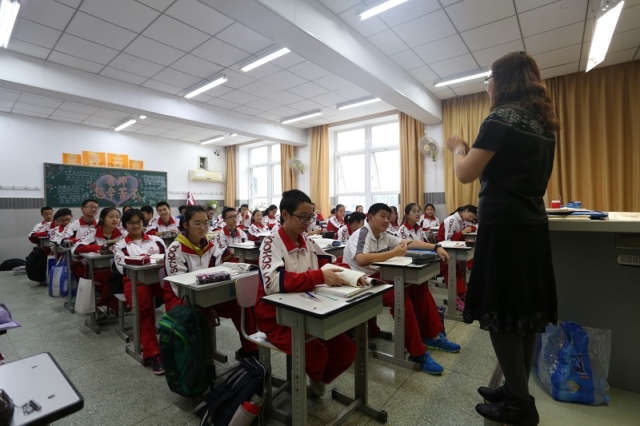Zhang is the head of the English Department at Beijing’s 101 Middle School, one of the leading educational institutions in the city.
“Even with my experience, I spend much more time than before on preparing for classes now, since we have so many new tools and equipment that we can use as teaching aides,” she says, with the enthusiasm and excitement of a newcomer to the profession.
The introduction of new technology, however, is only a part of the change that schools have experienced.
Along with the use of multimedia tools, Zhang emphasizes the need for innovative methods, such as plays and performance arts, to help students learn.
“I believe it is another way to ensure that students gain confidence and learn the language,” she explains, leading us to a hall where children are rehearsing for an English language festival that is to be held at the school.
While the methods are unique and the students seemed to be enjoying themselves, one wonders how effective these new approaches can be?
Despite the innovation, China’s middle school education remains geared towards one key goal, i.e., for students to do well in the national college entrance examination.
While the system has had many critics, Zhang believes that it does have its advantages.
“Exam-oriented education is actually important in China, since it offers a level playing field for all students to obtain a better education. But the approaches that teachers must adopt to help students learn and achieve good grades must be flexible and enriching,” she says.
However, she is quick to add that teaching is not merely about coursework, tools, technology and grades. Increasingly, teachers in China are playing a pivotal role in the development of children as responsible and well-adjusted adults.
Owing to the one-child policy on the Chinese mainland, families often tend to pamper the only child and have excessive expectations on them. This has meant that children grow up somewhat isolated and under tremendous pressure.
“We encounter students who struggle to cope with pressure. And as a teacher, you need to identify ways and means to communicate with both the students and their parents, to help them handle such situations,” explains Zhang.
For a teacher, developing such a bond with students over the years is a rewarding experience that often entails a bittersweet moment, as each batch graduates.
“Every three years, I have to bid farewell to my graduates. It feels like saying farewell to my own children,” she says.
However, it is such insight and emotional investment that has led Zhang to rise up the ranks and enjoy a fruitful career for nearly three decades. With just three more years to her retirement, she remains young at heart and optimistic about the future.
So what is the one tip that she can offer to those who wish to seek a career in teaching? Perhaps the answer lies less in what she says and more in how she says it.
“Being a teacher keeps me young and beautiful,” she chuckles in response. If there is a lesson that one can learn from Zhang, it is that a genuine spirit of enquiry along with a sense of humor can take one a long way.
Share your stories of change in China @CCTVNEWS or via colors@cctvnews.cn.
 CGTN America
CGTN America




